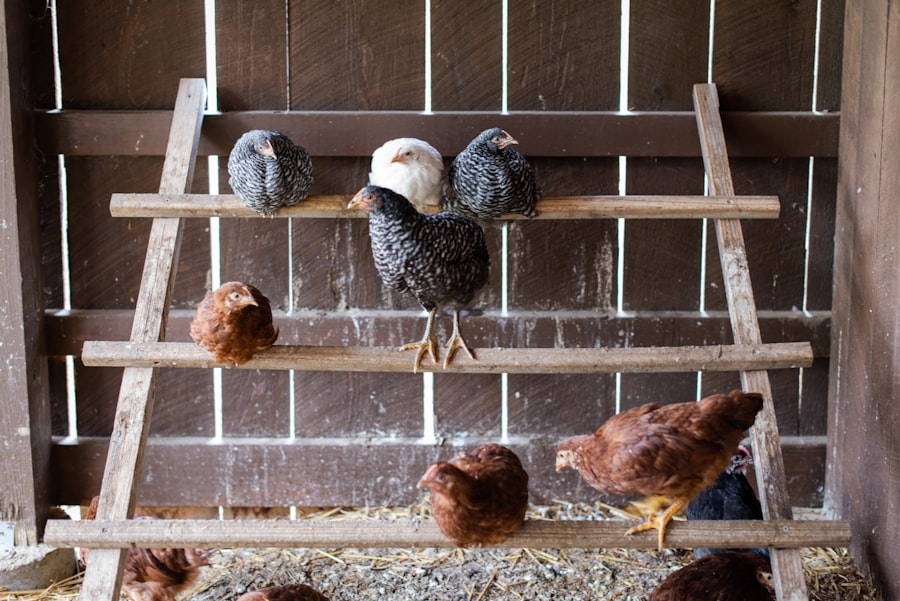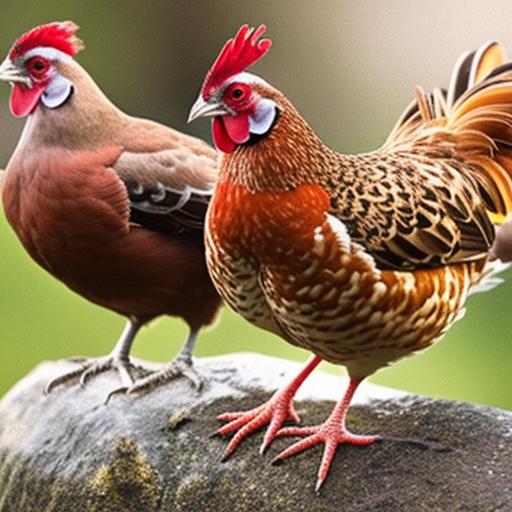Keeping chickens has a long history in the United Kingdom, dating back to the Victorian era when it became a popular hobby among the upper class. Today, keeping chickens has become increasingly popular among people of all backgrounds and is no longer limited to rural areas. There are many benefits to keeping chickens, including a fresh supply of eggs, natural pest control, and the joy of watching these fascinating creatures in your own backyard.
One of the main reasons people choose to keep chickens is for the fresh eggs they provide. Not only are homegrown eggs delicious and nutritious, but they also offer a sense of satisfaction and self-sufficiency. By keeping chickens, you can have a constant supply of fresh eggs right at your doorstep. Additionally, chickens are excellent at controlling pests in your garden. They will happily eat insects, slugs, and other unwanted critters, reducing the need for chemical pesticides.
Key Takeaways
- Keeping chickens in the UK is a popular hobby that requires careful planning and preparation.
- Choosing the right breed of chicken is important, as different breeds have different needs and characteristics.
- Preparing your garden or yard for chickens involves creating a safe and secure environment with adequate space and shelter.
- Building or choosing a chicken coop is essential for providing your chickens with a comfortable and secure place to roost and lay eggs.
- Essential equipment for keeping chickens includes feeders, waterers, and nesting boxes, as well as tools for cleaning and maintaining the coop.
Choosing the Right Breed of Chicken for Your Needs
When it comes to choosing the right breed of chicken for your needs, there are several factors to consider. First and foremost, you need to think about the purpose of keeping chickens. Are you primarily interested in egg production or do you want them for meat? Do you want a breed that is good with children or one that is more independent? These are all important questions to ask yourself before making a decision.
In the UK, there are many popular breeds of chickens to choose from. Some of the most common breeds include the Rhode Island Red, Sussex, and Orpington. Each breed has its own unique characteristics and advantages. For example, Rhode Island Reds are known for their excellent egg-laying abilities, while Sussex chickens are known for their friendly and docile nature. Orpingtons are a popular choice for families with children due to their calm and gentle temperament.
Preparing Your Garden or Yard for Chickens
Before bringing chickens into your garden or yard, it is important to make sure you have the proper infrastructure in place. This includes fencing and security measures to protect your chickens from predators, as well as providing them with enough space to roam and forage. Additionally, you need to consider the vegetation and landscaping in your garden, as some plants may be toxic to chickens.
Fencing is essential for keeping your chickens safe from predators such as foxes and birds of prey. A sturdy fence that is at least six feet high will help keep these unwanted visitors out. It is also important to bury the fence at least a foot underground to prevent predators from digging under it. In addition to fencing, you may want to consider installing a secure coop or run where your chickens can be safely confined at night or when you are not able to supervise them.
Building or Choosing a Chicken Coop
When it comes to building or choosing a chicken coop, there are several factors to consider. One of the first decisions you will need to make is whether you want to build your own coop or purchase a pre-made one. Building your own coop can be a rewarding DIY project, but it does require some basic carpentry skills and tools. On the other hand, purchasing a pre-made coop can save you time and effort, but it may be more expensive.
The size and design of your chicken coop will depend on the number of chickens you plan to keep and the available space in your garden or yard. As a general rule of thumb, each chicken should have at least four square feet of indoor space and ten square feet of outdoor space. The coop should also have proper ventilation and insulation to keep the chickens comfortable in all weather conditions.
Essential Equipment for Keeping Chickens
In addition to a chicken coop, there are several essential pieces of equipment you will need when keeping chickens. These include feeders and waterers, bedding and nesting boxes, cleaning supplies, and health and safety equipment.
Feeders and waterers are necessary to provide your chickens with a constant supply of food and water. There are many different types of feeders and waterers available, including hanging feeders, trough feeders, and automatic feeders. Similarly, there are various options for waterers, such as gravity-fed waterers and nipple waterers.
Bedding is important for keeping your chickens comfortable and for absorbing moisture and odors. Common bedding materials include straw, wood shavings, and shredded paper. Nesting boxes are also essential for providing a safe and comfortable place for your hens to lay their eggs. Each nesting box should be at least 12 inches square and filled with clean straw or shavings.
Feeding Your Chickens: What to Give and What to Avoid

Feeding your chickens a balanced diet is crucial for their health and productivity. The main component of their diet should be a good quality chicken feed that is specifically formulated for their needs. This feed should contain the right balance of protein, carbohydrates, vitamins, and minerals.
In addition to chicken feed, you can also supplement your chickens’ diet with treats and snacks. Some popular treats include fruits, vegetables, mealworms, and kitchen scraps. However, it is important to avoid feeding them anything that is toxic or harmful to their health. Foods to avoid include chocolate, onions, garlic, avocado, and anything high in salt or sugar.
Health and Hygiene: Keeping Your Chickens Healthy and Happy
Keeping your chickens healthy and happy is essential for their overall well-being. Regular observation is key to spotting any signs of illness or disease early on. Some common signs of illness in chickens include lethargy, loss of appetite, abnormal droppings, respiratory issues, and changes in behavior or appearance.
Preventative measures such as vaccinations and regular health checks can help keep your chickens healthy. It is also important to maintain good hygiene in and around the chicken coop. This includes regularly cleaning and disinfecting the coop, as well as providing clean bedding and fresh water. Additionally, you should practice good biosecurity measures to prevent the spread of diseases.
Understanding Chicken Behaviour: What Your Chickens are Telling You
Chickens have their own unique ways of communicating with each other and with their human caretakers. By understanding their body language and vocalizations, you can better understand their needs and emotions. For example, a chicken that is crouching low to the ground with its feathers puffed up may be feeling threatened or scared. On the other hand, a chicken that is vocalizing loudly and flapping its wings may be displaying dominance or aggression.
Chickens also have a social hierarchy known as the pecking order. This determines the ranking and dominance of each chicken within the flock. It is important to be aware of this hierarchy and to intervene if any bullying or aggression occurs. Additionally, understanding your chickens’ egg-laying habits can help you identify any issues or abnormalities.
Collecting and Using Eggs: Tips and Tricks
Collecting and using eggs from your own chickens can be a rewarding experience. However, it is important to handle eggs properly to ensure their freshness and safety. When collecting eggs, it is best to do so frequently to prevent them from becoming dirty or damaged. It is also important to store eggs in a cool place, preferably in the refrigerator, to maintain their freshness.
There are many creative ways to use eggs in cooking and baking. From omelettes and quiches to cakes and cookies, eggs are a versatile ingredient that can be used in a wide variety of recipes. If you find yourself with an excess of eggs, you can consider selling or giving them away to friends, family, or neighbors.
Troubleshooting Common Problems When Keeping Chickens
Keeping chickens is not without its challenges, and there are several common problems that can arise. Predators and pests are a constant threat to chickens, so it is important to take measures to protect them. This can include installing secure fencing, using deterrents such as motion-activated lights or sprinklers, and keeping the coop clean and free of food scraps that may attract pests.
Egg-laying issues can also occur, such as soft-shelled eggs, egg eating, or a decrease in egg production. These issues can be caused by various factors, including nutritional deficiencies, stress, or health problems. It is important to address these issues promptly to ensure the health and productivity of your chickens.
Behavioural problems can also arise in chickens, such as aggression, feather pecking, or excessive noise. These issues can be caused by a variety of factors, including overcrowding, boredom, or lack of socialization. Providing enough space, enrichment activities, and a balanced diet can help prevent these problems from occurring.
Keeping chickens in the UK has become increasingly popular for a variety of reasons. From the joy of collecting fresh eggs to the benefits of natural pest control, there are many advantages to having chickens in your garden or yard. By choosing the right breed, preparing your space properly, and providing the necessary equipment and care, you can enjoy the many rewards of keeping chickens. If you are considering keeping chickens, there are many resources available for further information and support, including online forums, books, and local poultry clubs. So why not take the plunge and start your own backyard flock today?
If you’re just starting out with keeping chickens in the UK, you may also be interested in learning about what other poultry can eat. Poultry Wizard has a helpful article on whether geese can eat chicken feed. It’s important to know what foods are safe and appropriate for different types of birds, so this article can provide valuable insights. Check it out here to expand your knowledge on poultry nutrition.
FAQs
What are the benefits of keeping chickens?
Keeping chickens can provide a source of fresh eggs, fertilizer for your garden, and can be a fun and educational hobby for the whole family.
What do I need to get started with keeping chickens?
You will need a secure coop for your chickens to sleep in, a run for them to exercise in, food and water containers, and bedding material such as straw or wood shavings.
What kind of chickens should I get?
There are many breeds of chickens to choose from, but some popular breeds for beginners include Rhode Island Reds, Plymouth Rocks, and Sussex.
What do chickens eat?
Chickens require a balanced diet of protein, carbohydrates, and vitamins. You can feed them commercial chicken feed, as well as fresh fruits and vegetables.
How often do I need to clean the coop?
You should clean the coop at least once a week, removing any soiled bedding and replacing it with fresh bedding. You should also clean the food and water containers regularly.
Do I need to worry about predators?
Yes, predators such as foxes, raccoons, and birds of prey can pose a threat to your chickens. Make sure your coop and run are secure and consider using electric fencing or other deterrents.
Do I need to provide my chickens with heat in the winter?
Chickens are hardy birds and can tolerate cold temperatures, but you may want to provide them with a heat source such as a heat lamp or heated water dish if temperatures drop below freezing.
Meet Walter, the feathered-friend fanatic of Florida! Nestled in the sunshine state, Walter struts through life with his feathered companions, clucking his way to happiness. With a coop that’s fancier than a five-star hotel, he’s the Don Juan of the chicken world. When he’s not teaching his hens to do the cha-cha, you’ll find him in a heated debate with his prized rooster, Sir Clucks-a-Lot. Walter’s poultry passion is no yolk; he’s the sunny-side-up guy you never knew you needed in your flock of friends!







